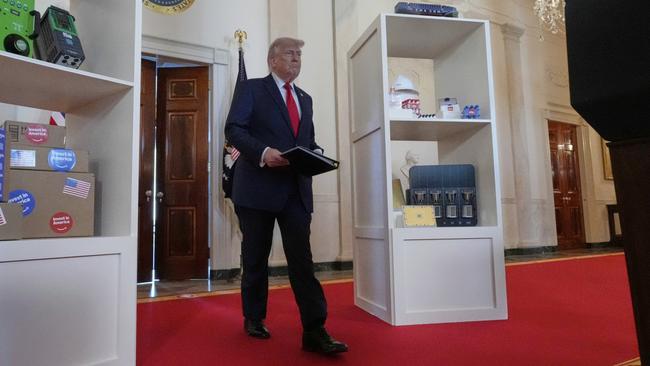Will a pragmatic tariff-imposing Trump back down and create investment opportunities?
Stagnant GDP, corporate distress, consumer panic and supply chain chaos increase the likelihood of Trump relenting on tariffs so there’s a contrarian opportunity to invest in a potential rally.

The US stock market is rallying, defying the chaos of unknowable tariffs and a new barrage of grim economic indicators.
With President Donald Trump’s aggressive tariffs – most notably a 135 per cent levy on Chinese imports – triggering fears of stagflation, a looming recession and collapsing consumer confidence, you might wonder why shares are climbing.
The answer lies in a paradoxical truth. The same economic distress fuelling market fears is likely to force Trump to scale back his tariff policies, reducing uncertainty and paving the way for a robust rally. Far from signalling a financial, macroeconomic or liquidity crisis, the current turmoil reflects merely a short-term sentiment shock.
It’s worth remembering that history demonstrates markets can rebound swiftly when fears of the worst-case scenario fade.
Trump’s first 100 days in office have been a whirlwind of executive orders, declared emergencies, and disruptive policies that have up-ended world trade, domestic economic stability and even democracy. His tariffs on global trade partners, particularly China, Mexico, and Canada, have toppled markets.
Earlier this year, America’s S&P 500 plummeted 19 per cent in one of the fastest declines since the 1950s, driven by uncertainty over trade wars, a projected halt in US-China trade by mid-May, and plunging consumer confidence to pandemic-era lows.
Goldman Sachs now forecasts US GDP growth at a mere 0.5 per cent for 2025, while Loomis Sayles predicts zero growth in 2025, pointing to a mild recession akin to 2001. Apollo Global Management chief economist Torsten Slok has warned of a 90 per cent chance of a “voluntary trade reset recession” marked by stagnant growth and inflation expectations surging to 6.7 per cent.
Corporate America is feeling the strain. S&P 500 earnings expectations are undergoing their sharpest downward revision since 2020. Industry leaders like Southwest Airlines’ CEO, Robert Jordan, describe conditions as recessionary, with consumers cutting back, as shown by reports from Chipotle and PepsiCo.
Plummeting new orders, collapsing container ship traffic, and spiking input costs from the Federal Reserve’s Manufacturing Prices Paid survey signal something of a corporate crisis. And small businesses, which employ more than 80 per cent of the US workforce, face existential threats from supply chain disruptions (remember what restarting supply chains after Covid-19 was like?) and tariff costs they cannot absorb.
Consumer sentiment is equally dire.
A new path for Trump
The economic fallout from Trump’s tariffs threatens his political capital and public support, which he closely monitors. A contracting economy, rising inflation, and widespread lay-offs
could erode his administration’s fabricated narrative of growth and prosperity. Trump’s sensitivity to public sentiment, coupled with his deal-making instincts, suggests he may soften his stance to avoid being blamed for a downturn.
Several factors support this view.
● First, economic data is likely influencing Trump’s advisers. Goldman Sachs says that the current 20-point tariff increase could tip the US into recession, while soaring inflation pressures demand action to stabilise prices. Small businesses – a key economic driver – face bankruptcy risks from supply chain chaos, with container ship traffic from China projected to halt by mid-May and US heavy truck sales at their lowest since the pandemic. These risks could push Trump to adopt a phased tariff approach, reducing immediate economic strain.
● Second, Trump has shown flexibility in his trade policies. His recent 90-day freeze on reciprocal tariffs and overtures toward trade deals with Mexico, Canada, and others hint at a pragmatic streak. A zero-tariff agreement within North America, for instance, could ease economic pressures and align with Trump’s deal-making persona. Such moves would reduce uncertainty, boost corporate investment, and restore consumer optimism, all of which are catalysts for a market rally.
● Third, external pressures may force Trump’s hand. The Federal Reserve faces a dilemma; tariff-driven inflation limits its ability to cut rates, but a slowing economy demands stimulus. Goldman Sachs predicts 200 basis-point rate cuts in 2025, but persistent inflation could constrain monetary policy. To preserve his growth narrative, Trump may moderate tariffs to allow the Fed more room to act.
If Trump scales back tariffs – whether through phased implementation or regional trade agreements – businesses will gain breathing room to adapt, boosting capital expenditure and hiring.
The US economy’s underlying resilience also fuels optimism. Despite current gloom, unemployment is low at 4 per cent, and job growth was robust in March with 228,000 jobs added. A tariff rollback could arrest the economic slide and amplify employment strength, allowing corporations to resume growth plans.
High-quality businesses, currently trading at more compressed valuations due to market panic stand to benefit most, rewarding contrarian investors who stay the course.
The economic indicators are undeniably dire – stagnant GDP, corporate distress, consumer panic and supply chain chaos create a gloomy backdrop.
Yet, these same factors increase the likelihood of Trump relenting on tariffs. His negotiation signals, political pressures, and pragmatic options indicate a policy shift that would stabilise markets. For investors, this presents a contrarian opportunity to capitalise on a potential rally.
Rather than fleeing, equity investors should consider the historical pattern of markets rebounding after trade tensions ease. The passing of the worst-case scenario – whether through tariff moderation or regional trade deals – could unleash optimism, driving the S&P 500 higher. High-quality businesses, undervalued amid the current panic, may be poised to lead the recovery.
For now, the rally reflects hope that the worst is over, and history suggests that hope is well-founded.
Roger Montgomery is founder and chief investment officer at Montgomery Investment Management.






To join the conversation, please log in. Don't have an account? Register
Join the conversation, you are commenting as Logout